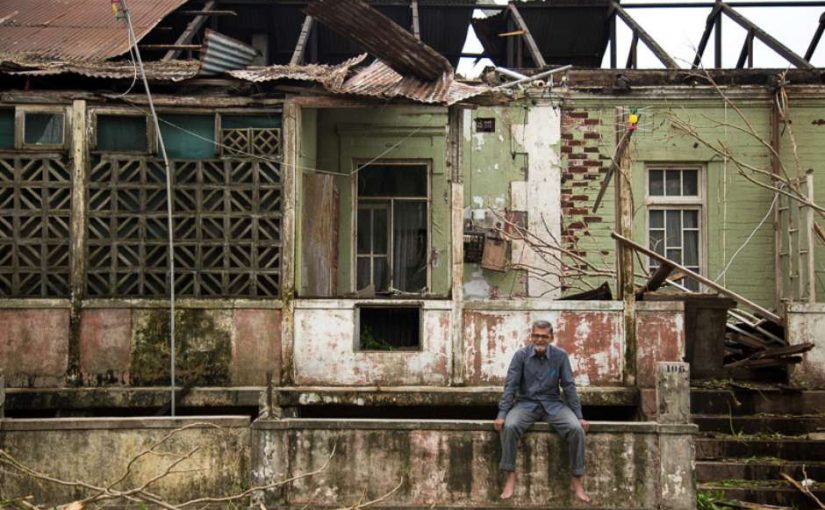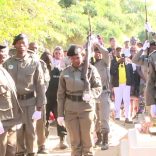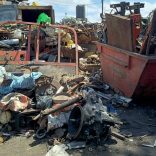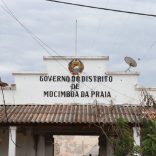Mozambique: Man arrested for ATM fraud - Notícias
Beira: “People no longer take the bodies to the mortuary, they stay with them”- Mozambican MP

Beira, March 19. Photo: International Federation of Red Cross and Red Crescent Societies
As national and international emergency teams fly and battle the clock to rescue some 350,000 Mozambicans still stranded for the fifth consecutive day in the districts of Búzi, Chibabava, Nhamatanda and Dondo, corpses continue to accumulate in Beira city’s mortuary. It is impossible to bury the dead.
“People no longer take the bodies to the mortuary, they stay with them,” Assembly of the Republic deputy Juliano Picardo, who made the journey between Nhamatanda district and the capital of Sofala province on foot, said on Wednesday.
The deputy also asked for help for the people staying at what’s left of his house.
“Support is being channelled to accommodation centres,we are forgetting that Beira is essentially urban”
At the close of this edition, the official death toll of Cyclone IDAI in central Mozambique was still at 202.
However, deputy Picardo, a Beira resident who arrived there on Sunday (March 17), said:
“I can assure you that the numbers that are presented in relation to human lives are not correct. There are no exact numbers: more corpses are appearing every day.”
“The people no longer take the bodies to the mortuary, they stay with them. The soil is all still under water so no burials can be performed. We are storing the bodies in safe places that are not flooded. It’s a scene of great sadness.”
The deputy, who was working in Chimoio last week, is a Renamo political adviser and ,on Sunday (17), having failed to communicate with his family in Beira’s Matacuane neighbourhood, started driving to the city in the company of another deputy, Francisco Maingue, and general in the reserve Hermínio de Morais. They had to abandon their 4×4 vehicle shortly after the Nhamatanda tollgate.

Rowboat to cross destroyed EN6
“We crossed the toll but the first bridge was washed away to the extent of about a kilometre. It was a residential area [before the cyclone]. On [the previous] Thursday, as I was going to Chimoio, I saw a lot of the traditional little houses that our community always builds but at the moment there is absolutely none,” Picardo said.
Locals told him that an irrigation dam for the agricultural fields had been unable to withstand the flow of water from the Metuxira river and gave way, washing away everything in its course.
The deputy and his fellow travellers managed to cross the washed-away section of the brand new National Road No. 6 in a rowboat borrowed from a British farmer who provided two workers to help them on their way and has been transporting many in a similar fashion

The 100 km walk to Beira
Let us avoid “sending officials to the disaster scene; we are only spending what little we have, which could benefit many instead,” Picardo says.
No means of transportation awaited the trio on the other side of the temporary lake, so the only solution was to walk the remaining 100 kilometres to Beira.
Along the way, through water “knee high”, Juliano Picardo had “the unique and sentimental opportunity of taking down bodies hanging from the trees”, at considerable risk to his own life.
“Imagine what it’s like, with nothing but my own hands, having to carry six corpses and put them down along National Road No. 6.”
“I saw vehicles with people still inside, while the helicopter was still turning above us. The information we got later was that it was the president, assessing the flooding in Lamego. Unfortunately, it did not come any lower. If it had, we could perhaps have removed the bodies from the car,” he said sadly, appealing to the government and humanitarian institutions to “stop using scarce aerial resources to fly over taking pictures and shooting movies, and go to where the human lives are”.
But, what with the president and travellers in the flooded regions, the 11 helicopters available are still less able to rescue the estimated 347,000 citizens who are considered to be at risk in the districts of Búzi, Chibabava, Nhamatanda and Dondo in the province of Sofala. There are also reports of an unknown number of beleaguered citizens in the district of Sussundenga, in Manica province.
The Sofala representative asked the government avoid “sending the leaders to the scene of the floods. We are only spending what little when we could benefit many people”. “I witnessed the arrival of a Boeing 737 with half a dozen ministers on board yesterday (Tuesday, 19). It did not bring not even one single pallet for the city of Beira in its hold. The plane took off for Nampula 15 minutes later.”
“Support is being channelled to accommodation centres – we are forgetting that the city of Beira is essentially urban.”

“Ponta-Gêa, Palmeiras, Macuti, Estoril – all that area does not exist anymore”
Picardo, who was living in the Sofala capital in 2000 when Cyclone Eline hit, said: “it was strong, but it does not match this. There is not one residence or building that has survived this nine-hour gale, there is not a single pane of glass [left intact].”
“Ponta-Gêa, Palmeiras, Macuti, Estoril – all that area does not exist anymore. The only buildings intact are the Dom Carlos and Estoril [hotels].” Even the official residences of the mayor and the governor could not withstand the 200 kilometres per hour winds.
The parliamentarian flew to Maputo to launch an appeal to the authorities: “Support is being channelled to accommodation centres, but we are forgetting that the city of Beira is essentially urban. Ninety percent of the roofs of buildings and homes have disappeared, and these people also need support. They don’t have water, they don’t have light, they don’t have money because they can’t withdraw any, and they don’t have fuel.”
According to the 2017 census. the devastated city has 533,825 inhabitants, but only the 14,198 people in all of Sofala province – those currently staying in the accommodation centres – are officially receiving aid.

“A chicken dish costs 1,500 meticais”
Picardo concluded by denouncing “the opportunism of our businesspeople. Price inflation – a candle costs 25 meticais, public transportation prices have been hiked, circulation in the city of Beira costs 30 meticais, a chicken dish costs 1,500 meticais… Our business owners have to show some solidarity at a time of great calamity.”
Maybe that’s why, on Wednesday afternoon, hungry citizens attempted to loot a food warehouse in the Matacuane neighbourhood. Police intervened, firing real bullets, and the population responded with stones, but the situation ended up calm and without any victims.
By Adérito Caldeira












Leave a Reply
Be the First to Comment!
You must be logged in to post a comment.
You must be logged in to post a comment.